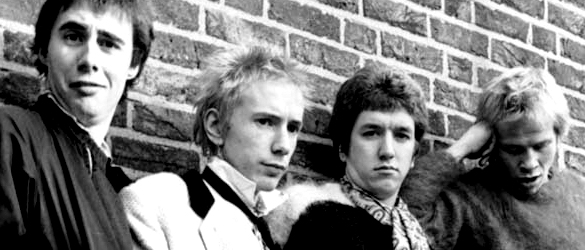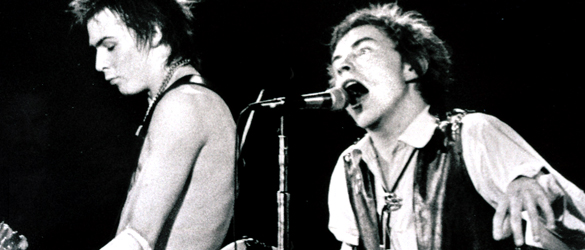I am not nor have I ever been a Punker. I was several years into my twenties before I heard Never Mind the Bollocks. I’ve always liked simple oldies-style three-chord rock. I liked Green Day when I was a kid, back when Dookie came out, but that was about as far as my interest in Just-Plain-Punk rock went. But I had heard of the Sex Pistols, could name two of the members and as many of the songs. By the time I actually listened to them I was already into Public Image Limited and lots of other Post-Punk bands. In addition, I had been turned onto the Stooges and additional examples of what is sometimes called Proto-Punk. For me the Sex Pistols existed only in the negative space created by the cultural periphery surrounding them and my opinion of the band could be summed up as, “I guess they’re supposed to be some kind of big deal.” I didn’t feel like I was missing anything.
When I finally got a copy of Never Mind the Bollocks (a used CD because I couldn’t find anything else I wanted that day) I felt the same way until I realized I was thinking about the idea of the band rather than the music. When I stopped thinking and started honing in on the sound rather than my suppositions, I finally got it. After one listen I looked to find the guitarist’s name. After several, I realized the commonly-held belief that the Pistols couldn’t play and were just a bunch of talentless hoods was flat wrong. (There are, however, accounts of them falling apart while playing live.) There’s not a bad song on the album, making it a true rarity. It’s a great record but I didn’t realize it until I took the music on its own, after snapping the narrative frame which had been built around it over the previous twenty-five years.
Rock journalism is often a partner to the marketing machine in mythologizing their mutual interests, namely the artists they cover and represent. Occasionally there is an act who participates in the process by buying into or reacting against the claims put forward by the myth-makers. The Sex Pistols were and still are such a group and fit this description in both respects. The band’s history is as much an exercise in competitive analysis as it is an account of actual activity. That alone is a confirmation that the band is somehow significant.
For reference I consulted five different short biographies: one from the band’s official website, another from the Rock and Roll Hall of Fame, third from Wikipedia, fourth from a British fan site called punk77, and last an article from the Gadfly archives (Feb 1998.) The common mythology can be summarized thus: rock music had become inflated and disconnected from its roots, then the Sex Pistols came along and, fueled by a disrespect for the industry establishment and a Do-It-Yourself ethic, they proceeded to single-handedly tear the world in half. Having already said I truly like the album, I’d like to address this narrative, considering the myth realistically in a series of points.
Consider a myth realistically? Doesn’t that defeat the purpose? I suppose it does, but since I hold that the Pistols weren’t so fundamentally different from other rock bands as everyone seems to believe, my respect for them is solely due to their music and I won’t be upset if I convince someone to refocus on what’s important about music, which is of course the music itself.
I use the terms in the myth summary above in lieu of the cliché “Rock is / was dead.” Rock was not dead. Apart from the fact that I actually like the Rolling Stones and Led Zepplin, it’s always bugged me when people say that. They said it during the hair-metal years and then Nirvana, etc came. They said it in the early aughts and then the Strokes, etc came. Either music marketers intentionally play up rock’s supposed demise in order to prep the public for the next big thing, or its fans simply don’t care what critics and analysts say and it is never allowed to die. Why would it? Has there ever been a form of music which truly disappeared? Maybe some old geographically-oriented forms of folk music, but nothing of late.
Back to the seventies, it is not hard to find a dozen real, raw rock bands besides the Stooges who were in operation, sweating out quality tunes before Punk broke, all of whom sound best when played at high volume. As stated above these acts are sometimes labeled Proto-Punk, a term which would surely never exist if Punk itself never solidified. Maybe the Pistols were aware of these groups, maybe they weren’t. Either way the Pistols summarily refused to acknowledge anyone’s influence being a positive force. DIY narrative-framing. And yes, mainstream rock was self-aggrandizing, but if that’s a crime, the Pistols were perpetual offenders. DIY back-patting.
Regardless of my perception of the album as being not much more than a short stack of great tracks, the public at the time of its release did react to the album passionately. What made Never Mind the Bollocks so different? Aesthetics. Style. Not substance. One obvious difference is the look of the band, which does not necessarily influence the effect of the record; one may hear the songs without ever seeing the people who perform them. Another difference between Never Mind The Bollocks and preexisting rock is the fact that the Sex Pistols’ songs contain vulgarity and explicitly anti-authoritarian messages, more overtly rebellious than the Who, more confrontational than Bob Dylan. And really, that’s a difference in quantity, not a matter of composition. Rock bands who came before were described as loud, brash, abrasive, all terms which apply to the Pistols. All they did was take it further, one-upping the previous generation of eyebrow-raisers. DIY branding.
Given that other raucous acts were already around, is it hard to imagine one of them or someone else would have produced the alternate-universe version of Never Mind the Bollocks? No, which does not take away from the fact that the Sex Pistols did it, but does make one wonder about the objective importance of what it was they did. The biography found on the Sex Pistols’ official website concludes with a statement that the world still needs the band. I am glad they existed. They made space for a bunch of music I might have never heard otherwise, but implicit in their statement is the notion that the world ever needed them, and more generally that a band can be needed. Instill in the consumer the perception of lack. DIY advertising.
Never Mind the Bollocks was certified gold by the RIAA in 1987, ten years after its release. It went platinum within another five years. 500,000 units in ten years is not in itself so significant. (That’s an average of 50,000 per year. The Eagles spit 50,000 records. Looking up these figures on the RIAA site, I saw that the latest Foster the People album has already gone gold. Haven’t heard of them? That’s my point. Have heard of them? Then you know they’re not big news.) What is noteworthy is first, that the Sex Pistols, despite their short time together, never really went away, and second that they sold more per year in the five years after their gold certification than the ten before. Despite the Pistols’ claims, the fans simply didn’t agree that they had been duped. Indeed, it seems they were out proselytizing new suckers. Even if the plan all along was to end their time as a band by insulting their audience, the notion that such an act should condemn all subsequent Punk musicians as fools is absurd. They spoke disparagingly about their imitators and followers, but it is likely that they wouldn’t have continued selling records had Punk not become established due to the efforts of these same consecutive bands, the fans, the record companies who signed them and the journalists who covered them. DIY pyramid scheme.
In summer 2010 a Sex Pistols’-branded unisex perfume was launched in Europe. DIY WTF? Such a product strikes me as bizarre, but doesn’t really irk me. I never had any stake in the myth and so such cynical marketing moves don’t bother me in principle, only in their relation to the narrative as it has been framed, which is at best an intriguing paradox, at worst pure hypocrisy. DIY cognitive dissonance.
Just what is it they were supposed to have Done-By-Themselves? Screw the industry, you don’t need a label, you can Do-It-Yourself. With the advent of internet distribution that is more true today than it was in the seventies, but the fact is the Pistols went through several labels and got paid by all of them. They were dropped because of their behavior but kept their advances. Maybe you admire that sort of mercenary mentality, maybe you don’t, but without management and publicity resources, the Sex Pistols might never have made it onto the Grundy talk show, never had the opportunity to gain such infamy. Surely becoming the very thing they always railed against was not the plan? But maybe it was. DIY everlasting duplicity.
What then is the Sex Pistols’ legacy? One real album, an imitable style, a utilitarian idiom and a persisting story. Punks still dress, sound and act that way, period. For a time, all sorts of weird, edgy music were labeled as Punk, but when the dust settled, the Pistols’ were the standard. If your band looks and/or sounds much like them, you’re Punk. That’s it. Countless interviews and documentaries have investigated the Punk phenomenon as imagined by its fans and participants whose opinions differ, but they rarely come out and say, “The Sex Pistols are the very definition of Punk.” It’s true, but it’s so fundamental that they either can’t see it or don’t bother to mention it. It would be like bringing up the invention of the wheel in the middle of a discussion about how much you like driving cars. Someone who spends their life bucking the system and living in the gutter might disagree. Someone who spends half their weekly pay at Hot Topic might disagree. There were hobos and hoodlums before the Sex Pistols. There were fops and dandies before the Sex Pistols. Punk is a genre and it was defined by its progenitors. By supposing that it does not merely refer to a moment in time and its residual effects, by imagining that it is actually a mentality or a way of life without looking realistically at its prime exemplars, one does not broaden one’s understanding, but dilutes it.
—-
J. Y. Hopkins lives in Lynchburg, Va. His short stories have appeared in the Dead Mule School of Southern Literature and Defenestration Magazine. More of his work can be found at http://jyhopkins.tumblr.com






You completely lost me with your deep analysis on what really was a simple summary. While America was listening to middle of the road shit like Chicago and the Eagles, England was rocking to the pistols in every city and town. Punk really didn’t happen in the states, NYC and LA that’s about it. You really had to be there, probably the most important album in uk history.
Hi I am writing a book the sex pistols. Could I possibly use some of your material from this essay on the sex pistols legacy in my book? I would of course fully credit you for the work
Sorry for the cheeky request Peter